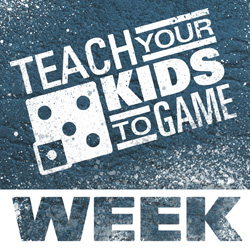 DriveThruRPG launched their Teach Your Kids to Game Week on Monday this week. With today’s digital assault of TV, video games, tablets, and such – this is a perfect time to keep the RPG fires burning and teach your kids, nieces, nephews, or any other kid you know the fun of RPG gaming. Where the options are limitless and not constrained by what the digital 1’s and 0’s can do.
DriveThruRPG launched their Teach Your Kids to Game Week on Monday this week. With today’s digital assault of TV, video games, tablets, and such – this is a perfect time to keep the RPG fires burning and teach your kids, nieces, nephews, or any other kid you know the fun of RPG gaming. Where the options are limitless and not constrained by what the digital 1’s and 0’s can do.
Teach Your Kids
I hear a lot of folks saying they will teach their kids to game when they are a little older. As someone that has taught kids about RPG games at an early age, you might be surprised at just how soon they are ready to take on some form of RPGs. You can read about some of my experience with how my kids started in last years ‘Teach Your Kids to Game’ post.
DriveThruRPG List
To help you out DriveThruRPG has a three page list of games available if you want something tailored to gaming with children right here. There are a variety of systems if you feel you want something geared specifically for kids.
I wrote an adventure or two contained in the Argyle and Crew’s adventure supplement. A game played with sock puppets! And a great way to teach the really young kids about RPGs and possibly even coach them through life experiences!
Another interesting product it the Dagger supplement, an OSR approach to teaching kids to game from Brave Halfling Publishing. I don’t have much experience with this system, but its advertised approach looks quite interesting and it is hanging out at four out of five stars at the moment.
Or Don’t Underestimate the Kids
The list above is useful if you really feel the need to have a kid specific product to intro kids to RPGs. But I think we sometimes underestimate kids and we can just “water” down an existing ruleset and make it playable by kids quite easily. As I have noted in the past, I’ve taught my kids to play with D&D 3.x or Pathfinder before there were actual starter sets for them. I just made sure to handle the heavy lifting of the specifics for them.
A lot of us started gaming when we were just kids. Self-taught perhaps around the age of 9 to 11. I know I taught myself Basic D&D from the Moldvay boxed set. Just think of what your kids can do with just a little bit of coaching and a similar rules set. I often think the best way to teach your kids to game is take the system you are familiar with, ask them what they want to be or what they see their characters doing and then apply a class to that and start playing.
Teach the Kids
Regardless – the important thing to take away from this week is to start teaching your kids to play! My kids love it and have been exposed to several different rule systems by this point. So whether it be simplifying your current favorite rules system or picking up a made for kids from the list above – take a few hours this coming up weekend and teach your kids to game!

See Cory Doctorow’s article on introducing his young daughter to the concept of the RPG.
http://boingboing.net/2013/10/25/dd-with-toddlers.html
Pingback: The Gassy Gnoll: Gaming with the Kids (Teach Your Kids to Game Week) | Game Knight Reviews
I just started an RPG club with the 5th graders in my job site.i teach at an afterschool program in NYC. a few years back, at another program I used the Lonewolf Multiplayer game system from mongoose for kids age 5-9, Matthew Sprange actually featured us in his online magazine Signs&Portents #83 . Now i’m using the Mouse Guard Roleplaying game since i’m with older kids. we meet 2 days a week, and if time allows, 3. Mondays is more geared toward literacy, so i spend more time with them writing journal entries as their characters.Wednesdays are our recreation days so we focus more on actually gaming.One of my goals is to run through one mission as a mouse guard team, then I plan on switching to a new system(i’d say in a few months) so that my students get to play various game systems and learn different styles of games.that way when they get older, they can find the game that is more for them and stick with it. My main goal is to help my kids develop their imagination and keep writing stories as their characters.